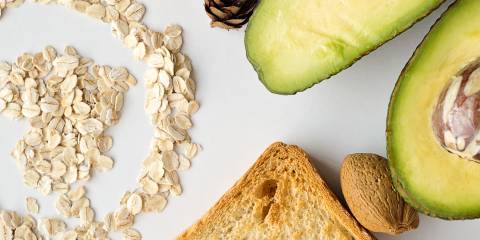It may not be glamorous. But fiber’s effects in the body—from blood sugar stabilization and weight control to disease prevention—are nothing short of showstopping.
Research has demonstrated fiber’s cardioprotective abilities. In addition, the recent long-term Iowa Women’s Health Study finds that women who eat four weekly servings or more of fiber-rich whole grains have a 31 percent reduced risk of dying from inflammatory conditions other than heart disease. That news is just one of many reasons fiber plays a central role in a healthful diet.
Need More?
“Low-fiber diets are associated with constipation, gastrointestinal disorders, diverticulosis, and colon cancer,” says Elson M. Haas, MD, “while a high-fiber diet may prevent these problems.”
Found exclusively in plant foods, fiber is either soluble or insoluble. The first type aids vital nutrient absorption by slowing digestion, and the second adds bulk to the stool, helping waste—and toxins—pass more quickly from the intestines.
The recommended daily fiber intake is 21 to 25 grams for women, 30 to 38 grams for men. While both types are important, soluble fiber in particular has been shown to benefit healthy cholesterol. A recent study found that 6 grams daily of one form, concentrated oat beta glucan, reduced total and LDL cholesterol in men and women with elevated levels after 6 weeks.
Other research shows that a low saturated-fat diet supplemented with another source of soluble fiber, psyllium (Plantago ovata husk), also raised HDL (healthy) cholesterol levels compared to supplementation with insoluble fiber.
Total fiber (both soluble and insoluble) from food sources appears to have an inverse relationship with certain cancers. A large-scale study in the U.K. indicates that the highest intake of dietary fiber (more than 30 grams per day, especially from whole-grain cereals and fruit) was linked to a reduced risk of breast cancer in premenopausal women.
Get All Seven
You may be surprised to learn that the classification of fiber does not end with soluble and insoluble. There are seven varieties, each with its own function.
Brans, gums, and mucilages help regulate blood glucose and lower cholesterol levels while supporting toxin removal. Find these types in oatmeal, oat and rice bran, sesame and fennel seeds, and dried beans. Guar gum also belongs in this group—but anyone who has trouble swallowing or has experienced GI surgery is wise to avoid this fiber source.
A strong internal cleanser, psyllium seed is one of the most popular supplemental fibers. Cellulose is the indigestible fiber found in the skins of plant foods. Useful sources include apples, beets, broccoli, carrots, celery, pears, and whole grains. Helpful for regularity and hemorrhoids, cellulose removes cancer-causing substances from the colon.
Hemicellulose is another complex carbohydrate the body cannot digest. As it moves through the digestive system, it absorbs water—helping to promote weight control and alleviate constipation, and supporting intestinal and colon health. Apples, bananas, beans, corn, green leafy vegetables, pears, and whole-grain cereals contain hemicellulose.
Lignan fiber is most abundant in flaxseeds but is also found in apricots, broccoli, cabbage, kale, sesame seeds, tofu, and whole grains, among other plant-based foods. This form may support healthy cholesterol. A phytoestrogen, lignan is not recommended in supplement form for women who are pregnant or breastfeeding.
Pectin helps control blood sugar by slowing the absorption of food after meals. Find this soluble fiber in apples, grapefruits, oranges, and other fruits, veggies, and legumes.
A nutritional supplement called modified citrus pectin, or MCP, is a form of pectin that has been molecularly altered to improve its bioavailability. Its potential benefits include removal of heavy metals from the body and cancer prevention.
Experts recommend alternating among several different supplemental fiber sources along with a fiber-rich diet. If you choose to take single or combination fiber formulas, do so at a separate time from any other supplements or medications to avoid decreasing the latter’s effectiveness.



